"The Five Foot Shelf of Knowledge". This Grand 50 Volume Complete Matching Set is the Easton Press Leather-Bound Millennium Edition. Each volume is Very Fine, sealed without any flaws. Includes the original pamphlet and Harvard Classics bookplates.
The Harvard Classics is significant because it brings together a comprehensive collection of Western Literary works - ranging from philosophy, history, and religion, to poetry, drama, and scientific thought.
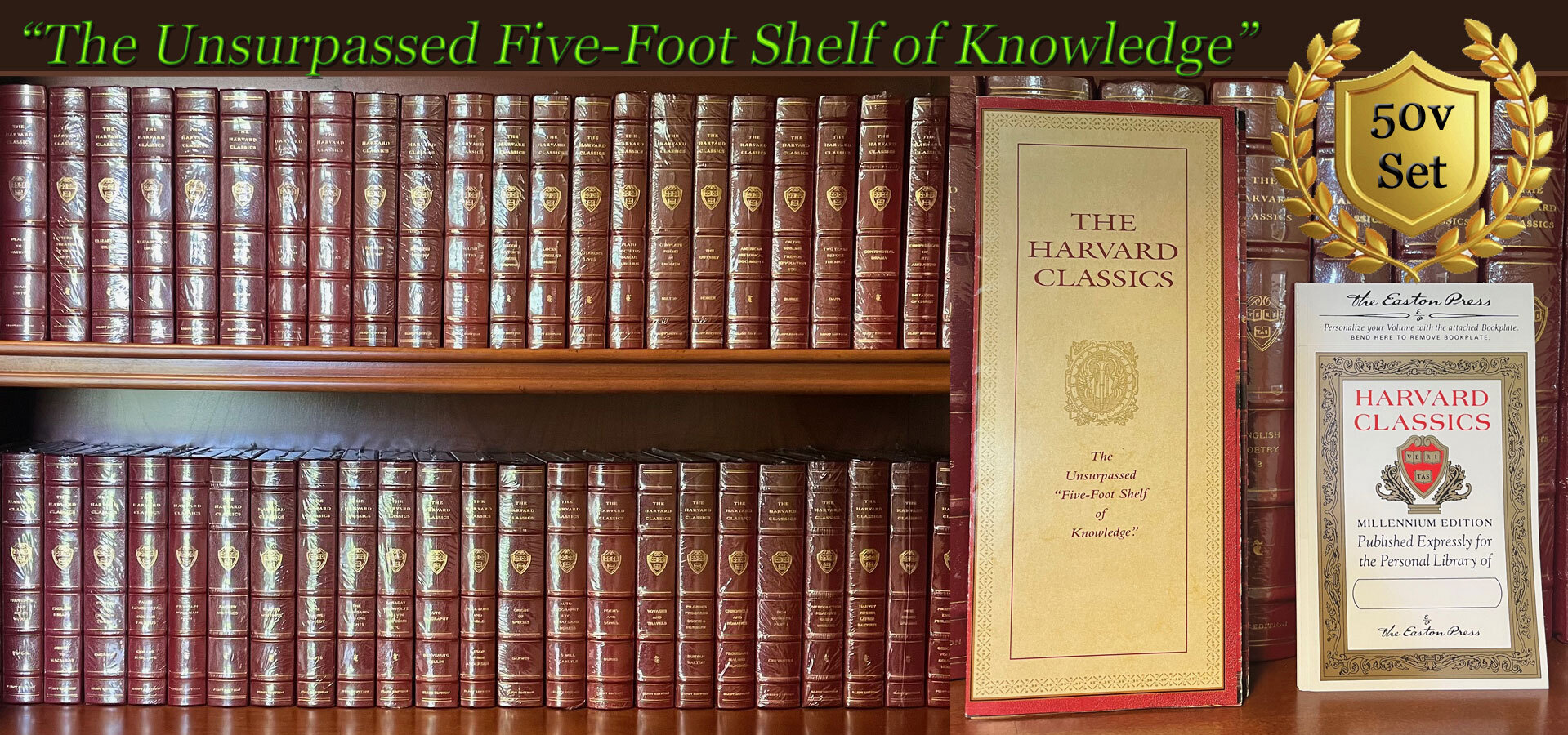
Ideal For the Scholar: A Complete Matching 50 volume Set!
Easton Press, Norwalk, Ct. 1994. Dr. Charles W. Eliot "The Harvard Classics". Millennium Limited Edition. Leather-Bound. 50-volume complete matching set. "Five Foot Shelf of Books". Luxuriously bound with full genuine leather with 22kt gold accents. All bookplates are unattached and unmarked. Includes the original publisher issued "Cross Reference Guide" card. This handy guide provides an invaluable card for referring back to the appropriate volume in the Harvard Classics collection. The cross-reference card measures 5"x8". Very Fine, sealed without any flaws.
Front and back covers gilt-stamped in 22 kt gold with veritas emblem of Harvard University. All edges cased in gilt. Spine lettering gilt, with Eliot Edition noted. Illustrated frontis in each, with protective tissue. Holographic end-papers of genuine silk, with gilt tooling on turn-ins. Red silk bookmarks in each. Each volume measures 6"x9".
Printed on archival quality paper, especially milled for this edition (as stated).
A truly unique and fascinating set to showcase in your home library or office. This edition is designed to outlast other printings of The Harvard Classics, and will make an enduring and luxurious addition to your own collection.
In 1910, Dr. Charles W. Eliot, then President of Harvard University, assembled an exceptional library of "all the books needed for a real education." This is the complete and full matching set, luxuriously bound in genuine leather. This collection features 1,850 works by over 300 poets, philosophers, scientists, explorers, and many others.
Features
Includes all the classic Easton Press qualities:
* Premium Leather
* Silk Moire Endleaves
* Distinctive Cover Design
* Hubbed Spine, Accented in Real 22KT Gold
* Satin Ribbon Page Marker
* Gilded Page Edges
* Long-lasting, High Quality Acid-neutral Paper
* Smyth-sewn Pages for Strength and Durability
* Beautiful Illustrations
This collection includes the following titles:
Volume I. - Benjamin Franklin, John Woolman, William Penn
Volume II. - Plato, Epictecus, Marcus Aurelius
Volume III. - Bacon, Milton's Prose, Thomas Browne
Volume IV. - Milton's Complete Poems in English
Volume V. - Emerson. Essays and English Traits
Volume VI. - Burns. Poems and Songs
Volume VII. - Saint Augustine, The Confessions. Thomas a Kempis, The Imitation of Christ
Volume VIII. - Nine Greek Dramas
Volume IX. - Letters and Treatises of Cicero and Pliny
Volume X. - Adam Smith. The Wealth of Nations
Volume XI. - Darwin. The Origin of Species
Volume XII. - Plutarch's Lives of the Noble Greeks and Romans
Volume XIII. - Virgil's Aeneid
Volume XIV. - Cervantes. Don Quixote, Part I
Volume XV. - Bunyan. The Pilgrim's Progress. Donne and Herbert. Isaak Walton
Volume XVI. - The Thousand and One Nights
Volume XVII. - Folk-Lore and Fable, Aesop, Grimm, Anderson
Volume XVIII. - Modern English Drama
Volume XIX. - Goethe: Faust, Egmont, etc. Marlowe: Doctor Faustus
Volume XX. - Dante. The Divine Comedy
Volume XXI. - Manzoni. I Promessi Sposi
Volume XXII. - Homer. The Odyssey
Volume XXIII. - Dana. Two Years Before the Mast
Volume XXIV. - Burke. On the Sublime; Reflections on the Revolution in France, etc.
Volume XXV. - J. S. Mill and Thomas Carlyle
Volume XXVI. - Continental Drama
Volume XXVII. - English Essays, Sidney to Macaulay
Volume XXVIII. - English and American Essays
Volume XXIX. - Darwin. Voyage of the Beagle
Volume XXX. - Faraday, Helmholtz, Kelvin, Newcomb, etc.
Volume XXXI. - Cellini. Autobiography
Volume XXXII. - Montaigne, Sainte-Beuve, Renan, etc.
Volume XXXIII. - Voyages and Travels
Volume XXXIV. - French & English Philosophers: Descartes, Voltaire, Rousseau, Hobbes
Volume XXXV. - Froissart, Malory, Holinshed
Volume XXXVI. - Machiavelli, More, Luther
Volume XXXVII. - Locke, Berkeley, Hume
Volume XXXVIII. - Harvey, Jenner, Lister, Pasteur
Volume XXXIX. - Famous Prefaces
Volume XL. - English Poetry, 1
Volume XLI. - English Poetry, 2
Volume XLII. - English Poetry, 3
Volume XLIII. - American Historical Documents
Volume XLIV. - Sacred Writings, 1
Volume XLV. - Sacred Writings, 2
Volume XLVI. - Elizabethan Drama, 1
Volume XLVII. - Elizabethan Drama, 2
Volume XLVIII. - Pascal. Thoughts and Minor Works
Volume XLIX. - Epic and Saga
Volume L. - Introduction, Reader's guide and Indexes
The Harvard Classics
The Harvard Classics, originally marketed as Dr. Eliot's Five-Foot Shelf of Books, is a 50-volume series of classic works of world literature, important speeches, and historical documents compiled and edited by Harvard University President Charles W. Eliot. Eliot believed that a careful reading of the series and following the eleven reading plans included in Volume 50 would offer a reader, in the comfort of the home, the benefits of a liberal education, entertainment and counsel of history's greatest creative minds. The initial success of The Harvard Classics was due, in part, to the branding offered by Eliot and Harvard University. Buyers of these sets were apparently attracted to Eliot's claims. The General Index contains upwards of 76,000 subject references.
The first 25 volumes were published in 1909 followed by the next 25 volumes in 1910. The collection was enhanced when the Lectures on The Harvard Classics was added in 1914 and Fifteen Minutes a Day - The Reading Guide in 1916. The Lectures on The Harvard Classics was edited by Willam A. Neilson, who had assisted Eliot in the selection and design of the works in Volumes 1–49.[8] Neilson also wrote the introductions and notes for the selections in Volumes 1–49. The Harvard Classics is often described as a "51 volume" set, however, P.F. Collier & Son consistently marketed the Harvard Classics as 50 volumes plus Lectures and a Daily Reading Guide. Both The Harvard Classics and The Five-Foot Shelf of Books are registered trademarks of P.F. Collier & Son for a series of books used since 1909.
Collier advertised The Harvard Classics in U.S. magazines including Collier's and McClure's, offering to send a pamphlet to prospective buyers. The pamphlet, entitled Fifteen Minutes a Day - A Reading Plan, is a 64-page booklet that describes the benefits of reading, gives the background on the book series, and includes many statements by Eliot about why he undertook the project. In the pamphlet, Eliot states:
"My aim was not to select the best fifty, or best hundred, books in the world, but to give, in twenty-three thousand pages or thereabouts, a picture of the progress of the human race within historical times, so far as that progress can be depicted in books. The purpose of The Harvard Classics is, therefore, one different from that of collections in which the editor's aim has been to select a number of best books; it is nothing less than the purpose to present so ample and characteristic a record of the stream of the world's thought that the observant reader's mind shall be enriched, refined and fertilized. Within the limits of fifty volumes, containing about twenty-three thousand pages, my task was to provide the means of obtaining such knowledge of ancient and modern literature as seemed essential to the twentieth-century idea of a cultivated man. The best acquisition of a cultivated man is a liberal frame of mind or way of thinking; but there must be added to that possession acquaintance with the prodigious store of recorded discoveries, experiences, and reflections which humanity in its intermittent and irregular progress from barbarism to civilization has acquired and laid up."
Dr. Eliot's Five-Foot Shelf of Books
The idea of the Harvard Classics was presented in speeches by then President Charles W. Eliot of Harvard University. Several years prior to 1909, Eliot gave a speech in which he remarked that a three-foot shelf would be sufficient to hold enough books to give a liberal education to anyone who would read them with devotion. He was inundated with requests for the list of those book titles that would fill the three-foot shelf. After many attempts to support his initial claim, he decided that the shelf would need to be lengthened to five feet - but a definitive list of works was not declared. A well-known publisher, Peter Fenelon Collier and his son, Robert J. Collier, saw a financial opportunity and asked that Eliot make good on his statement by selecting 50 volumes (400 to 500 pages each). Collier representatives proposed the name for the series as either "The Harvard Library" or "The Harvard Classics" pending approval by Harvard University. The proposal, presented to the President and Fellows of Harvard College, was unanimously approved as a useful undertaking from an educational point of view.
In February 1909 with his approaching retirement as President of Harvard University, Eliot accepted the proposal of P.F. Collier & Son. The agreement allowed Eliot to engage an assistant. He chose William A. Neilson, Professor of English at Harvard University. The English Bible was excluded because Eliot and Neilson felt that almost every household would already possess at least one copy. The contributions of living authors (other than scientific contributions) were excluded because Eliot and Neilson considered the "verdict of the educated world" was not yet final. Works of modern fiction were felt to be readily accessible and thus excluded. English and American literature as well as documents related to American social and political ideas were more likely to be selected because the Harvard Classics were intended primarily for American readers.
Eliot retired as President of Harvard University in May 1909 and devoted much of the next year to organizing the 50 volumes and selecting the list of included works. The first half of the included works was provided to P.F. Collier & Son in 1909. However, Eliot and Neilson did not make the remaining selections, write the introductions for each selection, or finish the general index until 1910. Consequently, P.F. Collier & Son printed volumes 1 to 25 in 1909 and volumes 26 to 50 in 1910.[7] An advertisement for The Harvard Classics appeared in Collier's on April 30, 1909, stating the "Complete Official Contents Now Ready."[12] With the help of more than 50 Harvard professors and instructors and the general library of Harvard University and its department libraries, Eliot and Neilson believed that the title "The Harvard Classics" was well deserved.
Harvard Classics Bookplates
Charles William Eliot
 Charles William Eliot (March 20, 1834 - August 22, 1926) was an American academic who was selected as Harvard's president in 1869. He transformed the provincial college into the preeminent American research university. Eliot served the longest term as president in the university's history.
Charles William Eliot (March 20, 1834 - August 22, 1926) was an American academic who was selected as Harvard's president in 1869. He transformed the provincial college into the preeminent American research university. Eliot served the longest term as president in the university's history.
Eliot's legacy
Under Eliot, Harvard became a national institution, recruiting its students from around the country using standardized entrance examination and hiring distinguished scholars from home and abroad. Eliot was an administrative reformer, reorganizing the university's faculty into schools and departments and replacing recitations with lectures and seminars. During his forty year presidency, the university vastly expanded its facilities, with laboratories, libraries, classrooms, and athletic facilities replacing simple colonial structures. Eliot attracted the support of major donors from among the nation's growing plutocracy, making it the wealthiest private university in the world.
Eliot's leadership not only made Harvard the pace-setter for other American colleges and universities, but a major figure in the reform of secondary school education. Both the elite boarding schools, most of them founded during his presidency, and the public high schools shaped their curricula to meet Harvard's demanding standards. Eliot was a key figure in the creation of standardized admissions examinations, as a founding member of the College Entrance Examining Board.
As leader of the nation's wealthiest and best-known university, Eliot was necessarily a celebrated figure whose opinions were sought on a wide variety of matters, from tax policy (he offered the first coherent rationale for the charitable tax exemption) to the intellectual welfare of the general public. He edited the Harvard Classics, which together are colloquially known as his Five Foot Shelf and which were intended at the time to suggest a foundation for informed discourse.
Eliot was a fearless crusader not only for educational reform, but for many of the goals of the progressive movement -- whose most prominent figure head was Theodore Roosevelt (Class of 1880) and most eloquent spokesman was Herbert Croly (Class of 1889). He was also involved in philanthropy, serving as a trustee of the Rockefeller Foundation from 1914 to 1917.
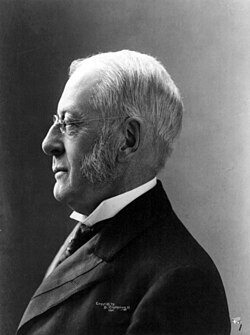
Original Pamphlet
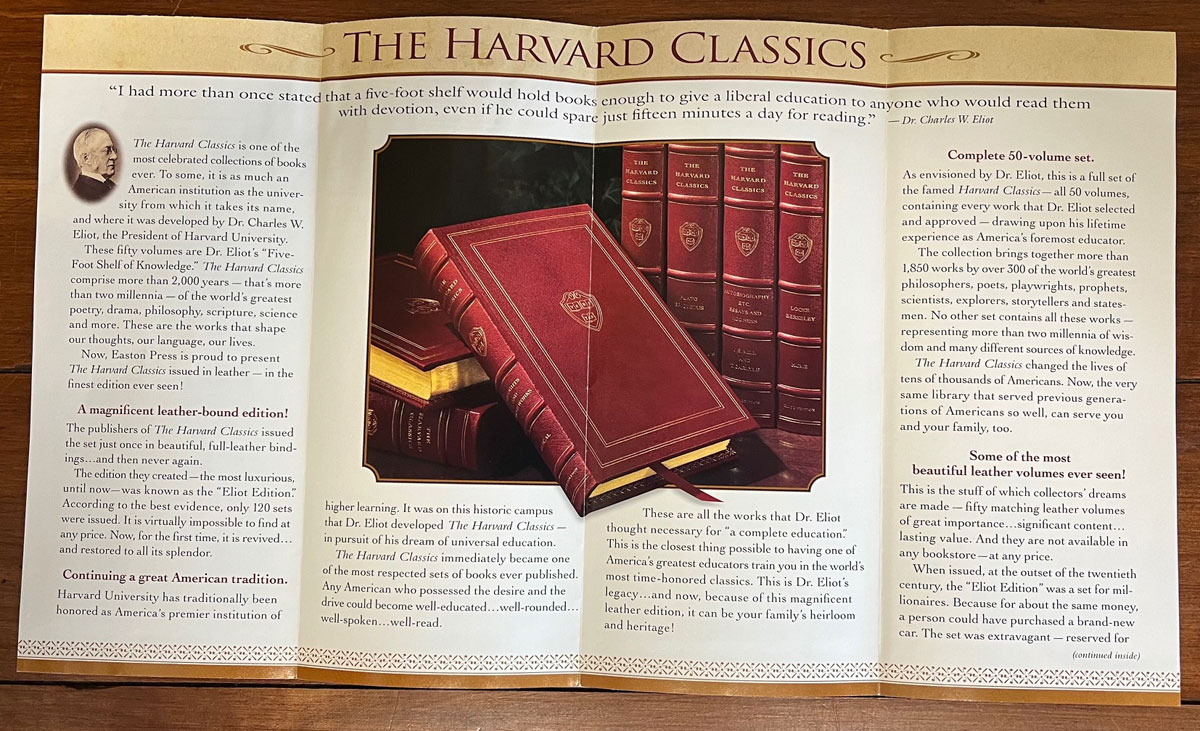
- Publisher:
- Easton Press (1994)
- Edition:
- Limited Edition
- Binding:
- Full Genuine Leather
- Title:
- The Harvard Classics (Millennium Edition)
![Easton Press "The Harvard Classics" Millennium Edition, Complete 50-Volume Set w/ Reference Guide and Pamphlet [Sealed] Easton Press "The Harvard Classics" Millennium Edition, Complete 50-Volume Set w/ Reference Guide and Pamphlet [Sealed]](https://cdn11.bigcommerce.com/s-eohzfjch7f/images/stencil/500x659/products/701/26476/IMG_7007435__94899.1749206205.jpg?c=1)
![Easton Press "The Harvard Classics" Millennium Edition, Complete 50-Volume Set w/ Reference Guide and Pamphlet [Sealed] Easton Press "The Harvard Classics" Millennium Edition, Complete 50-Volume Set w/ Reference Guide and Pamphlet [Sealed]](https://cdn11.bigcommerce.com/s-eohzfjch7f/images/stencil/50x50/products/701/26476/IMG_7007435__94899.1749206205.jpg?c=1)
![Easton Press "The Harvard Classics" Millennium Edition, Complete 50-Volume Set w/ Reference Guide and Pamphlet [Sealed] Easton Press "The Harvard Classics" Millennium Edition, Complete 50-Volume Set w/ Reference Guide and Pamphlet [Sealed]](https://cdn11.bigcommerce.com/s-eohzfjch7f/images/stencil/50x50/products/701/26456/EP-Harvard-Classics-FullSet__33101.1749206204.jpg?c=1)
![Easton Press "The Harvard Classics" Millennium Edition, Complete 50-Volume Set w/ Reference Guide and Pamphlet [Sealed] Easton Press "The Harvard Classics" Millennium Edition, Complete 50-Volume Set w/ Reference Guide and Pamphlet [Sealed]](https://cdn11.bigcommerce.com/s-eohzfjch7f/images/stencil/50x50/products/701/26478/Harvard_7110__61276.1749220643.jpg?c=1)
![Easton Press "The Harvard Classics" Millennium Edition, Complete 50-Volume Set w/ Reference Guide and Pamphlet [Sealed] Easton Press "The Harvard Classics" Millennium Edition, Complete 50-Volume Set w/ Reference Guide and Pamphlet [Sealed]](https://cdn11.bigcommerce.com/s-eohzfjch7f/images/stencil/50x50/products/701/26459/EP-Harvard-Classics-1__95009.1749220642.jpg?c=1)
![Easton Press "The Harvard Classics" Millennium Edition, Complete 50-Volume Set w/ Reference Guide and Pamphlet [Sealed] Easton Press "The Harvard Classics" Millennium Edition, Complete 50-Volume Set w/ Reference Guide and Pamphlet [Sealed]](https://cdn11.bigcommerce.com/s-eohzfjch7f/images/stencil/50x50/products/701/26472/EP-Harvard-Classics-8__18866.1749206205.jpg?c=1)
![Easton Press "The Harvard Classics" Millennium Edition, Complete 50-Volume Set w/ Reference Guide and Pamphlet [Sealed] Easton Press "The Harvard Classics" Millennium Edition, Complete 50-Volume Set w/ Reference Guide and Pamphlet [Sealed]](https://cdn11.bigcommerce.com/s-eohzfjch7f/images/stencil/50x50/products/701/26455/EP-Harvard-Classics-7__73011.1749206204.jpg?c=1)
![Easton Press "The Harvard Classics" Millennium Edition, Complete 50-Volume Set w/ Reference Guide and Pamphlet [Sealed] Easton Press "The Harvard Classics" Millennium Edition, Complete 50-Volume Set w/ Reference Guide and Pamphlet [Sealed]](https://cdn11.bigcommerce.com/s-eohzfjch7f/images/stencil/50x50/products/701/26477/IMG_7111__00107.1749220654.jpg?c=1)
![Easton Press "The Harvard Classics" Millennium Edition, Complete 50-Volume Set w/ Reference Guide and Pamphlet [Sealed] Easton Press "The Harvard Classics" Millennium Edition, Complete 50-Volume Set w/ Reference Guide and Pamphlet [Sealed]](https://cdn11.bigcommerce.com/s-eohzfjch7f/images/stencil/50x50/products/701/26454/EP-Harvard-Classics-3__12547.1749220654.jpg?c=1)
![Easton Press "The Harvard Classics" Millennium Edition, Complete 50-Volume Set w/ Reference Guide and Pamphlet [Sealed] Easton Press "The Harvard Classics" Millennium Edition, Complete 50-Volume Set w/ Reference Guide and Pamphlet [Sealed]](https://cdn11.bigcommerce.com/s-eohzfjch7f/images/stencil/50x50/products/701/26453/EP-Harvard-Classics-6__15757.1749220642.jpg?c=1)
![Easton Press "The Harvard Classics" Millennium Edition, Complete 50-Volume Set w/ Reference Guide and Pamphlet [Sealed] Easton Press "The Harvard Classics" Millennium Edition, Complete 50-Volume Set w/ Reference Guide and Pamphlet [Sealed]](https://cdn11.bigcommerce.com/s-eohzfjch7f/images/stencil/50x50/products/701/26464/IMG_7012_edited__99448.1749220642.jpg?c=1)
![Easton Press "The Harvard Classics" Millennium Edition, Complete 50-Volume Set w/ Reference Guide and Pamphlet [Sealed] Easton Press "The Harvard Classics" Millennium Edition, Complete 50-Volume Set w/ Reference Guide and Pamphlet [Sealed]](https://cdn11.bigcommerce.com/s-eohzfjch7f/images/stencil/50x50/products/701/26457/IMG_7095_edited__76157.1749206204.jpg?c=1)
![Easton Press "The Harvard Classics" Millennium Edition, Complete 50-Volume Set w/ Reference Guide and Pamphlet [Sealed] Easton Press "The Harvard Classics" Millennium Edition, Complete 50-Volume Set w/ Reference Guide and Pamphlet [Sealed]](https://cdn11.bigcommerce.com/s-eohzfjch7f/images/stencil/50x50/products/701/26469/IMG_7096_edited__63557.1749206205.jpg?c=1)
![Easton Press "The Harvard Classics" Millennium Edition, Complete 50-Volume Set w/ Reference Guide and Pamphlet [Sealed] Easton Press "The Harvard Classics" Millennium Edition, Complete 50-Volume Set w/ Reference Guide and Pamphlet [Sealed]](https://cdn11.bigcommerce.com/s-eohzfjch7f/images/stencil/50x50/products/701/26471/IMG_7097_edited__51163.1749206205.jpg?c=1)
![Easton Press "The Harvard Classics" Millennium Edition, Complete 50-Volume Set w/ Reference Guide and Pamphlet [Sealed] Easton Press "The Harvard Classics" Millennium Edition, Complete 50-Volume Set w/ Reference Guide and Pamphlet [Sealed]](https://cdn11.bigcommerce.com/s-eohzfjch7f/images/stencil/50x50/products/701/26467/IMG_7098_edited__31575.1749206205.jpg?c=1)
![Easton Press "The Harvard Classics" Millennium Edition, Complete 50-Volume Set w/ Reference Guide and Pamphlet [Sealed] Easton Press "The Harvard Classics" Millennium Edition, Complete 50-Volume Set w/ Reference Guide and Pamphlet [Sealed]](https://cdn11.bigcommerce.com/s-eohzfjch7f/images/stencil/50x50/products/701/26458/IMG_7099_edited__07280.1749206204.jpg?c=1)
![Easton Press "The Harvard Classics" Millennium Edition, Complete 50-Volume Set w/ Reference Guide and Pamphlet [Sealed] Easton Press "The Harvard Classics" Millennium Edition, Complete 50-Volume Set w/ Reference Guide and Pamphlet [Sealed]](https://cdn11.bigcommerce.com/s-eohzfjch7f/images/stencil/50x50/products/701/26465/IMG_7033_edited__89730.1749220642.jpg?c=1)
![Easton Press "The Harvard Classics" Millennium Edition, Complete 50-Volume Set w/ Reference Guide and Pamphlet [Sealed] Easton Press "The Harvard Classics" Millennium Edition, Complete 50-Volume Set w/ Reference Guide and Pamphlet [Sealed]](https://cdn11.bigcommerce.com/s-eohzfjch7f/images/stencil/50x50/products/701/26473/IMG_7034_edited__59713.1749220642.jpg?c=1)
![Easton Press "The Harvard Classics" Millennium Edition, Complete 50-Volume Set w/ Reference Guide and Pamphlet [Sealed] Easton Press "The Harvard Classics" Millennium Edition, Complete 50-Volume Set w/ Reference Guide and Pamphlet [Sealed]](https://cdn11.bigcommerce.com/s-eohzfjch7f/images/stencil/50x50/products/701/26466/IMG_7035_edited__23765.1749220642.jpg?c=1)
![Easton Press "The Harvard Classics" Millennium Edition, Complete 50-Volume Set w/ Reference Guide and Pamphlet [Sealed] Easton Press "The Harvard Classics" Millennium Edition, Complete 50-Volume Set w/ Reference Guide and Pamphlet [Sealed]](https://cdn11.bigcommerce.com/s-eohzfjch7f/images/stencil/50x50/products/701/26474/IMG_7036_edited__92006.1749220642.jpg?c=1)
![Easton Press "The Harvard Classics" Millennium Edition, Complete 50-Volume Set w/ Reference Guide and Pamphlet [Sealed] Easton Press "The Harvard Classics" Millennium Edition, Complete 50-Volume Set w/ Reference Guide and Pamphlet [Sealed]](https://cdn11.bigcommerce.com/s-eohzfjch7f/images/stencil/50x50/products/701/26475/IMG_7101_edited__37832.1749220642.jpg?c=1)
![Easton Press "The Harvard Classics" Millennium Edition, Complete 50-Volume Set w/ Reference Guide and Pamphlet [Sealed] Easton Press "The Harvard Classics" Millennium Edition, Complete 50-Volume Set w/ Reference Guide and Pamphlet [Sealed]](https://cdn11.bigcommerce.com/s-eohzfjch7f/images/stencil/50x50/products/701/26463/IMG_7102_edited__09341.1749220642.jpg?c=1)
![Easton Press "The Harvard Classics" Millennium Edition, Complete 50-Volume Set w/ Reference Guide and Pamphlet [Sealed] Easton Press "The Harvard Classics" Millennium Edition, Complete 50-Volume Set w/ Reference Guide and Pamphlet [Sealed]](https://cdn11.bigcommerce.com/s-eohzfjch7f/images/stencil/50x50/products/701/26470/IMG_7030_edited__33683.1749220642.jpg?c=1)
![Easton Press "The Harvard Classics" Millennium Edition, Complete 50-Volume Set w/ Reference Guide and Pamphlet [Sealed] Easton Press "The Harvard Classics" Millennium Edition, Complete 50-Volume Set w/ Reference Guide and Pamphlet [Sealed]](https://cdn11.bigcommerce.com/s-eohzfjch7f/images/stencil/50x50/products/701/26461/IMG_7031_edited__72635.1749220642.jpg?c=1)
![Easton Press "The Harvard Classics" Millennium Edition, Complete 50-Volume Set w/ Reference Guide and Pamphlet [Sealed] Easton Press "The Harvard Classics" Millennium Edition, Complete 50-Volume Set w/ Reference Guide and Pamphlet [Sealed]](https://cdn11.bigcommerce.com/s-eohzfjch7f/images/stencil/50x50/products/701/26462/IMG_7029_edited__73757.1749220642.jpg?c=1)
![Easton Press "The Harvard Classics" Millennium Edition, Complete 50-Volume Set w/ Reference Guide and Pamphlet [Sealed] Easton Press "The Harvard Classics" Millennium Edition, Complete 50-Volume Set w/ Reference Guide and Pamphlet [Sealed]](https://cdn11.bigcommerce.com/s-eohzfjch7f/images/stencil/50x50/products/701/26481/IMG_7115__93877.1749220729.jpg?c=1)
![Easton Press "The Harvard Classics" Millennium Edition, Complete 50-Volume Set w/ Reference Guide and Pamphlet [Sealed] Easton Press "The Harvard Classics" Millennium Edition, Complete 50-Volume Set w/ Reference Guide and Pamphlet [Sealed]](https://cdn11.bigcommerce.com/s-eohzfjch7f/images/stencil/50x50/products/701/26479/IMG_7114__36846.1749220729.jpg?c=1)
![Easton Press "The Harvard Classics" Millennium Edition, Complete 50-Volume Set w/ Reference Guide and Pamphlet [Sealed] Easton Press "The Harvard Classics" Millennium Edition, Complete 50-Volume Set w/ Reference Guide and Pamphlet [Sealed]](https://cdn11.bigcommerce.com/s-eohzfjch7f/images/stencil/50x50/products/701/26480/IMG_7112__25132.1749220729.jpg?c=1)
![Easton Press "The Harvard Classics" Millennium Edition, Complete 50-Volume Set w/ Reference Guide and Pamphlet [Sealed] Easton Press "The Harvard Classics" Millennium Edition, Complete 50-Volume Set w/ Reference Guide and Pamphlet [Sealed]](https://cdn11.bigcommerce.com/s-eohzfjch7f/images/stencil/1280x1280/products/701/26476/IMG_7007435__94899.1749206205.jpg?c=1)
![Easton Press "The Harvard Classics" Millennium Edition, Complete 50-Volume Set w/ Reference Guide and Pamphlet [Sealed] Easton Press "The Harvard Classics" Millennium Edition, Complete 50-Volume Set w/ Reference Guide and Pamphlet [Sealed]](https://cdn11.bigcommerce.com/s-eohzfjch7f/images/stencil/1280x1280/products/701/26456/EP-Harvard-Classics-FullSet__33101.1749206204.jpg?c=1)
![Easton Press "The Harvard Classics" Millennium Edition, Complete 50-Volume Set w/ Reference Guide and Pamphlet [Sealed] Easton Press "The Harvard Classics" Millennium Edition, Complete 50-Volume Set w/ Reference Guide and Pamphlet [Sealed]](https://cdn11.bigcommerce.com/s-eohzfjch7f/images/stencil/1280x1280/products/701/26478/Harvard_7110__61276.1749220643.jpg?c=1)
![Easton Press "The Harvard Classics" Millennium Edition, Complete 50-Volume Set w/ Reference Guide and Pamphlet [Sealed] Easton Press "The Harvard Classics" Millennium Edition, Complete 50-Volume Set w/ Reference Guide and Pamphlet [Sealed]](https://cdn11.bigcommerce.com/s-eohzfjch7f/images/stencil/1280x1280/products/701/26459/EP-Harvard-Classics-1__95009.1749220642.jpg?c=1)
![Easton Press "The Harvard Classics" Millennium Edition, Complete 50-Volume Set w/ Reference Guide and Pamphlet [Sealed] Easton Press "The Harvard Classics" Millennium Edition, Complete 50-Volume Set w/ Reference Guide and Pamphlet [Sealed]](https://cdn11.bigcommerce.com/s-eohzfjch7f/images/stencil/1280x1280/products/701/26472/EP-Harvard-Classics-8__18866.1749206205.jpg?c=1)
![Easton Press "The Harvard Classics" Millennium Edition, Complete 50-Volume Set w/ Reference Guide and Pamphlet [Sealed] Easton Press "The Harvard Classics" Millennium Edition, Complete 50-Volume Set w/ Reference Guide and Pamphlet [Sealed]](https://cdn11.bigcommerce.com/s-eohzfjch7f/images/stencil/1280x1280/products/701/26455/EP-Harvard-Classics-7__73011.1749206204.jpg?c=1)
![Easton Press "The Harvard Classics" Millennium Edition, Complete 50-Volume Set w/ Reference Guide and Pamphlet [Sealed] Easton Press "The Harvard Classics" Millennium Edition, Complete 50-Volume Set w/ Reference Guide and Pamphlet [Sealed]](https://cdn11.bigcommerce.com/s-eohzfjch7f/images/stencil/1280x1280/products/701/26477/IMG_7111__00107.1749220654.jpg?c=1)
![Easton Press "The Harvard Classics" Millennium Edition, Complete 50-Volume Set w/ Reference Guide and Pamphlet [Sealed] Easton Press "The Harvard Classics" Millennium Edition, Complete 50-Volume Set w/ Reference Guide and Pamphlet [Sealed]](https://cdn11.bigcommerce.com/s-eohzfjch7f/images/stencil/1280x1280/products/701/26454/EP-Harvard-Classics-3__12547.1749220654.jpg?c=1)
![Easton Press "The Harvard Classics" Millennium Edition, Complete 50-Volume Set w/ Reference Guide and Pamphlet [Sealed] Easton Press "The Harvard Classics" Millennium Edition, Complete 50-Volume Set w/ Reference Guide and Pamphlet [Sealed]](https://cdn11.bigcommerce.com/s-eohzfjch7f/images/stencil/1280x1280/products/701/26453/EP-Harvard-Classics-6__15757.1749220642.jpg?c=1)
![Easton Press "The Harvard Classics" Millennium Edition, Complete 50-Volume Set w/ Reference Guide and Pamphlet [Sealed] Easton Press "The Harvard Classics" Millennium Edition, Complete 50-Volume Set w/ Reference Guide and Pamphlet [Sealed]](https://cdn11.bigcommerce.com/s-eohzfjch7f/images/stencil/1280x1280/products/701/26464/IMG_7012_edited__99448.1749220642.jpg?c=1)
![Easton Press "The Harvard Classics" Millennium Edition, Complete 50-Volume Set w/ Reference Guide and Pamphlet [Sealed] Easton Press "The Harvard Classics" Millennium Edition, Complete 50-Volume Set w/ Reference Guide and Pamphlet [Sealed]](https://cdn11.bigcommerce.com/s-eohzfjch7f/images/stencil/1280x1280/products/701/26457/IMG_7095_edited__76157.1749206204.jpg?c=1)
![Easton Press "The Harvard Classics" Millennium Edition, Complete 50-Volume Set w/ Reference Guide and Pamphlet [Sealed] Easton Press "The Harvard Classics" Millennium Edition, Complete 50-Volume Set w/ Reference Guide and Pamphlet [Sealed]](https://cdn11.bigcommerce.com/s-eohzfjch7f/images/stencil/1280x1280/products/701/26469/IMG_7096_edited__63557.1749206205.jpg?c=1)
![Easton Press "The Harvard Classics" Millennium Edition, Complete 50-Volume Set w/ Reference Guide and Pamphlet [Sealed] Easton Press "The Harvard Classics" Millennium Edition, Complete 50-Volume Set w/ Reference Guide and Pamphlet [Sealed]](https://cdn11.bigcommerce.com/s-eohzfjch7f/images/stencil/1280x1280/products/701/26471/IMG_7097_edited__51163.1749206205.jpg?c=1)
![Easton Press "The Harvard Classics" Millennium Edition, Complete 50-Volume Set w/ Reference Guide and Pamphlet [Sealed] Easton Press "The Harvard Classics" Millennium Edition, Complete 50-Volume Set w/ Reference Guide and Pamphlet [Sealed]](https://cdn11.bigcommerce.com/s-eohzfjch7f/images/stencil/1280x1280/products/701/26467/IMG_7098_edited__31575.1749206205.jpg?c=1)
![Easton Press "The Harvard Classics" Millennium Edition, Complete 50-Volume Set w/ Reference Guide and Pamphlet [Sealed] Easton Press "The Harvard Classics" Millennium Edition, Complete 50-Volume Set w/ Reference Guide and Pamphlet [Sealed]](https://cdn11.bigcommerce.com/s-eohzfjch7f/images/stencil/1280x1280/products/701/26458/IMG_7099_edited__07280.1749206204.jpg?c=1)
![Easton Press "The Harvard Classics" Millennium Edition, Complete 50-Volume Set w/ Reference Guide and Pamphlet [Sealed] Easton Press "The Harvard Classics" Millennium Edition, Complete 50-Volume Set w/ Reference Guide and Pamphlet [Sealed]](https://cdn11.bigcommerce.com/s-eohzfjch7f/images/stencil/1280x1280/products/701/26465/IMG_7033_edited__89730.1749220642.jpg?c=1)
![Easton Press "The Harvard Classics" Millennium Edition, Complete 50-Volume Set w/ Reference Guide and Pamphlet [Sealed] Easton Press "The Harvard Classics" Millennium Edition, Complete 50-Volume Set w/ Reference Guide and Pamphlet [Sealed]](https://cdn11.bigcommerce.com/s-eohzfjch7f/images/stencil/1280x1280/products/701/26473/IMG_7034_edited__59713.1749220642.jpg?c=1)
![Easton Press "The Harvard Classics" Millennium Edition, Complete 50-Volume Set w/ Reference Guide and Pamphlet [Sealed] Easton Press "The Harvard Classics" Millennium Edition, Complete 50-Volume Set w/ Reference Guide and Pamphlet [Sealed]](https://cdn11.bigcommerce.com/s-eohzfjch7f/images/stencil/1280x1280/products/701/26466/IMG_7035_edited__23765.1749220642.jpg?c=1)
![Easton Press "The Harvard Classics" Millennium Edition, Complete 50-Volume Set w/ Reference Guide and Pamphlet [Sealed] Easton Press "The Harvard Classics" Millennium Edition, Complete 50-Volume Set w/ Reference Guide and Pamphlet [Sealed]](https://cdn11.bigcommerce.com/s-eohzfjch7f/images/stencil/1280x1280/products/701/26474/IMG_7036_edited__92006.1749220642.jpg?c=1)
![Easton Press "The Harvard Classics" Millennium Edition, Complete 50-Volume Set w/ Reference Guide and Pamphlet [Sealed] Easton Press "The Harvard Classics" Millennium Edition, Complete 50-Volume Set w/ Reference Guide and Pamphlet [Sealed]](https://cdn11.bigcommerce.com/s-eohzfjch7f/images/stencil/1280x1280/products/701/26475/IMG_7101_edited__37832.1749220642.jpg?c=1)
![Easton Press "The Harvard Classics" Millennium Edition, Complete 50-Volume Set w/ Reference Guide and Pamphlet [Sealed] Easton Press "The Harvard Classics" Millennium Edition, Complete 50-Volume Set w/ Reference Guide and Pamphlet [Sealed]](https://cdn11.bigcommerce.com/s-eohzfjch7f/images/stencil/1280x1280/products/701/26463/IMG_7102_edited__09341.1749220642.jpg?c=1)
![Easton Press "The Harvard Classics" Millennium Edition, Complete 50-Volume Set w/ Reference Guide and Pamphlet [Sealed] Easton Press "The Harvard Classics" Millennium Edition, Complete 50-Volume Set w/ Reference Guide and Pamphlet [Sealed]](https://cdn11.bigcommerce.com/s-eohzfjch7f/images/stencil/1280x1280/products/701/26470/IMG_7030_edited__33683.1749220642.jpg?c=1)
![Easton Press "The Harvard Classics" Millennium Edition, Complete 50-Volume Set w/ Reference Guide and Pamphlet [Sealed] Easton Press "The Harvard Classics" Millennium Edition, Complete 50-Volume Set w/ Reference Guide and Pamphlet [Sealed]](https://cdn11.bigcommerce.com/s-eohzfjch7f/images/stencil/1280x1280/products/701/26461/IMG_7031_edited__72635.1749220642.jpg?c=1)
![Easton Press "The Harvard Classics" Millennium Edition, Complete 50-Volume Set w/ Reference Guide and Pamphlet [Sealed] Easton Press "The Harvard Classics" Millennium Edition, Complete 50-Volume Set w/ Reference Guide and Pamphlet [Sealed]](https://cdn11.bigcommerce.com/s-eohzfjch7f/images/stencil/1280x1280/products/701/26462/IMG_7029_edited__73757.1749220642.jpg?c=1)
![Easton Press "The Harvard Classics" Millennium Edition, Complete 50-Volume Set w/ Reference Guide and Pamphlet [Sealed] Easton Press "The Harvard Classics" Millennium Edition, Complete 50-Volume Set w/ Reference Guide and Pamphlet [Sealed]](https://cdn11.bigcommerce.com/s-eohzfjch7f/images/stencil/1280x1280/products/701/26481/IMG_7115__93877.1749220729.jpg?c=1)
![Easton Press "The Harvard Classics" Millennium Edition, Complete 50-Volume Set w/ Reference Guide and Pamphlet [Sealed] Easton Press "The Harvard Classics" Millennium Edition, Complete 50-Volume Set w/ Reference Guide and Pamphlet [Sealed]](https://cdn11.bigcommerce.com/s-eohzfjch7f/images/stencil/1280x1280/products/701/26479/IMG_7114__36846.1749220729.jpg?c=1)
![Easton Press "The Harvard Classics" Millennium Edition, Complete 50-Volume Set w/ Reference Guide and Pamphlet [Sealed] Easton Press "The Harvard Classics" Millennium Edition, Complete 50-Volume Set w/ Reference Guide and Pamphlet [Sealed]](https://cdn11.bigcommerce.com/s-eohzfjch7f/images/stencil/1280x1280/products/701/26480/IMG_7112__25132.1749220729.jpg?c=1)

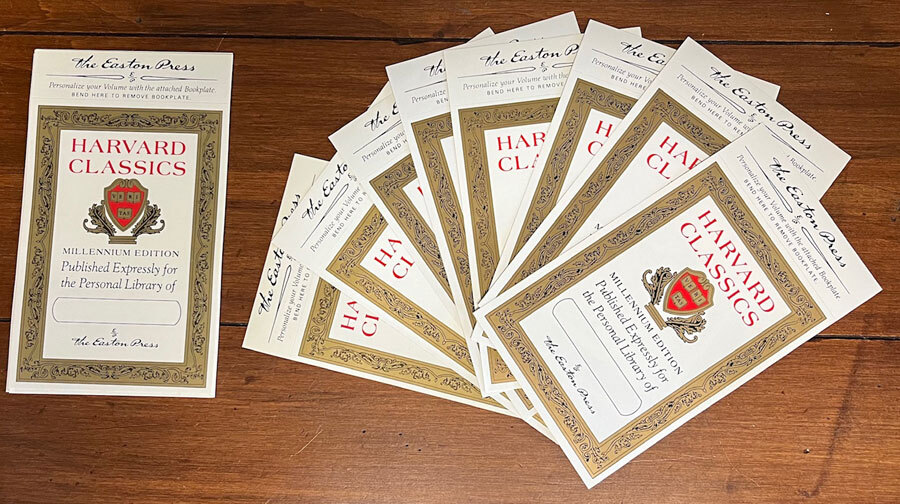
![Easton Press (FEL) The First Edition Library - Slipcased 56 Volume Set of the Classics w/Note Cards and Pamphlet [Sealed/Near Fine] Easton Press (FEL) The First Edition Library - Slipcased 56 Volume Set of the Classics w/Note Cards and Pamphlet [Sealed/Near Fine]](https://cdn11.bigcommerce.com/s-eohzfjch7f/images/stencil/500x659/products/1796/25770/56-CommpleteSet-1__81231.1745605529.jpg?c=1)
![Easton Press "Nathaniel Hawthorne Masterpieces" Limited Edition, 3-Volume Complete Matching Set [Sealed] Easton Press "Nathaniel Hawthorne Masterpieces" Limited Edition, 3-Volume Complete Matching Set [Sealed]](https://cdn11.bigcommerce.com/s-eohzfjch7f/images/stencil/500x659/products/2201/8220/Nataniel_Hawthorne_the_Blithedale_Romance_The_Scarlet_Letter_The_house_of_the_seven_1__12360.1607607621.jpg?c=1)
![Easton Press "Plato: Complete Works" Leather Bound Limited Edition, Complete 4 Volume Matching Set [Sealed] Easton Press "Plato: Complete Works" Leather Bound Limited Edition, Complete 4 Volume Matching Set [Sealed]](https://cdn11.bigcommerce.com/s-eohzfjch7f/images/stencil/500x659/products/801/10082/Plato_4_vol_set_-1__78848.1634299352.JPG?c=1)
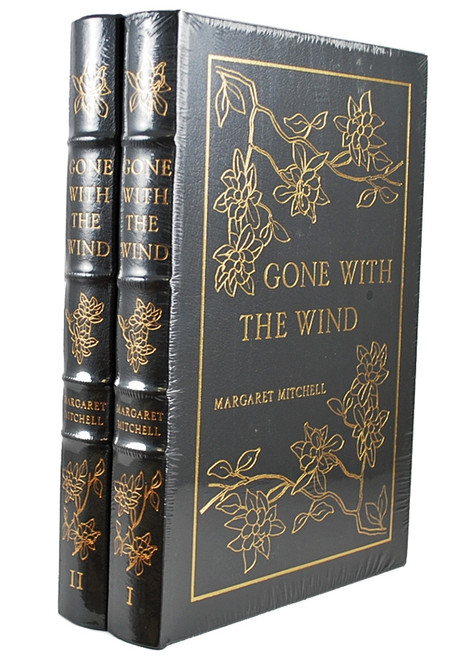
![Easton Press "The Complete Works of Aristotle" Leather Bound Limited Edition, Five Volume Matching Set [Sealed] Easton Press "The Complete Works of Aristotle" Leather Bound Limited Edition, Five Volume Matching Set [Sealed]](https://cdn11.bigcommerce.com/s-eohzfjch7f/images/stencil/500x659/products/726/9515/DSC_0746__95414.1625919818.JPG?c=1)